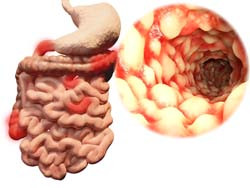Inflammatory bowel disease
In Europe alone, over 2 million people suffer from some form of IBD and the numbers are steadily rising. Despite scientific advances, little is known about IBD aetiology and diagnosis is therefore difficult. Billions of euros in direct health care costs are attributed to IBDs annually. IBD patients suffer from inflammation in their digestive system organs. Besides the painful abdominal cramps, such patients suffer from recurring diarrhoea, anaemia and extreme tiredness. Treatment involves the use of immunosuppressants and anti-inflammatories. Patients unresponsive to such treatment often need to undergo surgery to remove or repair damaged tissue. EU-funded researchers of the 'Inflammatory bowel disease characterization by a multi-modal integrated biomarker study' (IBD-CHARACTER)(opens in new window) project are working to identify biomarkers for IBD. This multidisciplinary consortium will employ genomics, epigenomics, proteomics and metagenomics techniques to develop a comprehensive molecular profile of IBD. Already, 240 patients with onset of IBD and no prior treatment exposure have been recruited for this study. Researchers have identified over 160 IBD-associated loci, and comparison of DNA methylation profiles of IBD and non-IBD patients is ongoing. Genome-wide association studies helped identify susceptibility genes for IBD. Project members will compare gut microbial content as well as the genomic, proteomic and metagenomic profiles of IBD and non-IBD patients. This should provide insight into IBD pathogenesis and yield novel biomarkers for early detection, risk stratification and IBD treatment response assessment. Current IBD diagnostic tests are highly invasive with patients undergoing a colonoscopy and a biopsy. Project outcomes should aid in the development of biomarker panels for non-invasively detecting IBD. Comprehensive molecular profiling should also reveal potential therapeutic targets that target the disease rather than just alleviate painful symptoms. This should improve the quality of life of IBD patients.







